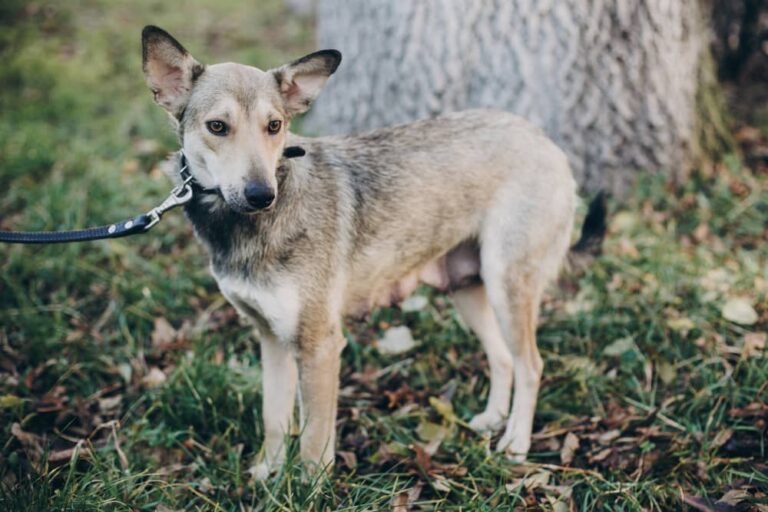Can dogs eat Honey Almond Butter? – Transform Your Dog’s Treat Time
can dogs eat honey almond butter? Regarding our furry friends’ diets, pet owners often wonder if certain human foods are safe for dogs. honey almond butter is a popular nut butter enjoyed by many people, and naturally, the question arises: can dogs eat honey honey almond butter?
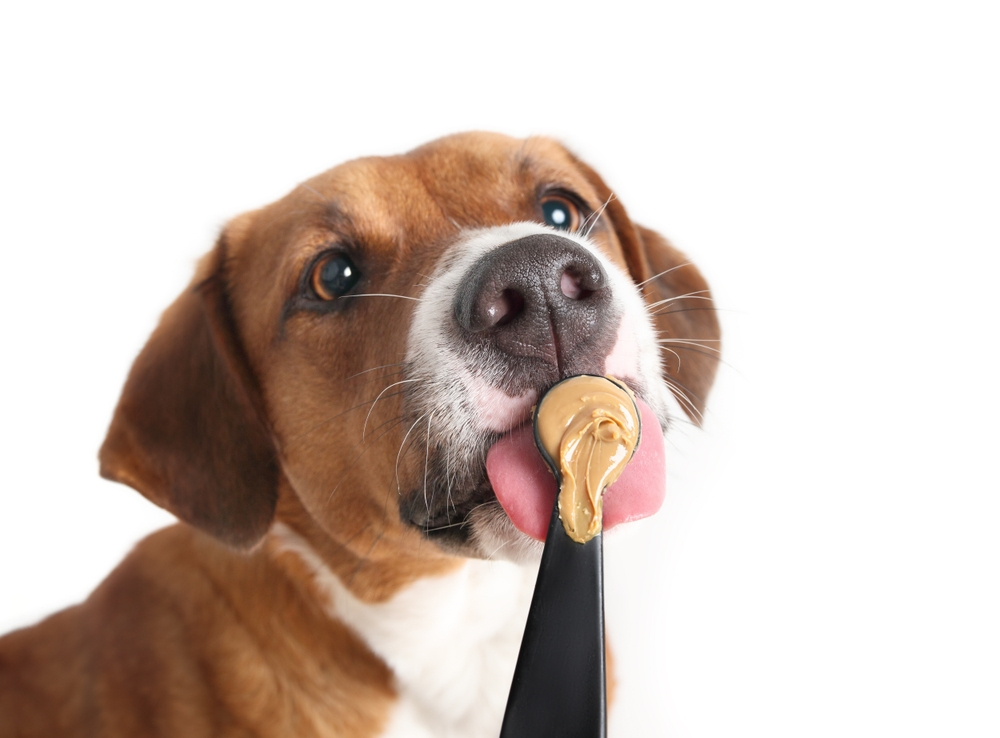
In this blog, we will explore the potential benefits and risks of feeding almond butter to dogs. We’ll delve into the nutritional and potential health implications and provide expert advice on responsible pet ownership.
What is Honey Almond Butter?
Almond butter is a paste made from ground almonds. It is similar to peanut butter in texture and appearance but with a distinct nutty flavor. Almond butter is rich in healthy fats, protein, vitamins, and minerals.
It is commonly used as a spread on toast, in smoothies, or as an ingredient in baked goods. Its popularity among health-conscious individuals has led to questions about whether dogs are safe to consume.
Is Almond Butter Safe for Dogs?
Is honey almond butter safe for dogs? While honey almond butter can be a nutritious addition to a human’s diet, it is not without potential risks for dogs. Some dogs may have allergies or sensitivities to almonds or other nuts, which can cause adverse reactions.
Additionally, almond butter is high in fat, and excessive consumption can lead to weight gain and other health issues in dogs. Therefore, caution is important when considering feeding your furry friend almond butter.
can dogs eat honey honey almond butter every day?
So, is almond butter safe for dogs? Feeding dogs almond butter daily is not recommended due to its high fat content. Moderation is key.
The Benefits of honey almond butter for Dogs
Almond butter offers several potential benefits for dogs. It is a good source of healthy fats, protein, vitamin E, and magnesium. These nutrients can support your dog’s overall health, promote a shiny coat, and aid muscle development. Additionally, almond butter can be a great way to hide medications or supplements your dog may need.
Promotes Healthy Skin and Coat
Almond butter contains vitamin E, known for its positive effects on skin and coat health. When consumed in moderation, almond butter can contribute to maintaining a shiny and lustrous coat in dogs.
The Dangers of Xylitol in honey almond butter
One of the significant concerns regarding almond butter is the potential presence of xylitol. Xylitol is a sugar substitute commonly found in many human food products, including almond butter jars.
Xylitol is highly toxic to dogs and can cause a severe drop in blood sugar levels, leading to liver failure. Therefore, it is crucial only to offer almond butter that does not contain xylitol.
Barney Butter Almond Butter, Bare Smooth, 16 Ounce Jar, No Added Sugar or Salt, Skin-Free Almonds, No Stir, Non-GMO, Gluten Free, Keto, Paleo, Vegan
2 LB Powdered Peanut Butter from US Farms – Bulk, Only 1 Ingredient – Roasted Peanuts, Vegan, No Additives, Preservative Free, No Salt, No Sugar – 76 Servings – NAKED PB
Can dogs eat honey almond butter: Nutritional Benefits
Rich in Healthy Fats
honey almond butter contains healthy fats, such as monounsaturated fats, which can support a dog’s overall health. These fats contribute to a shiny coat and healthy skin and provide energy. However, it’s crucial to remember that moderation is key in fat intake for dogs.
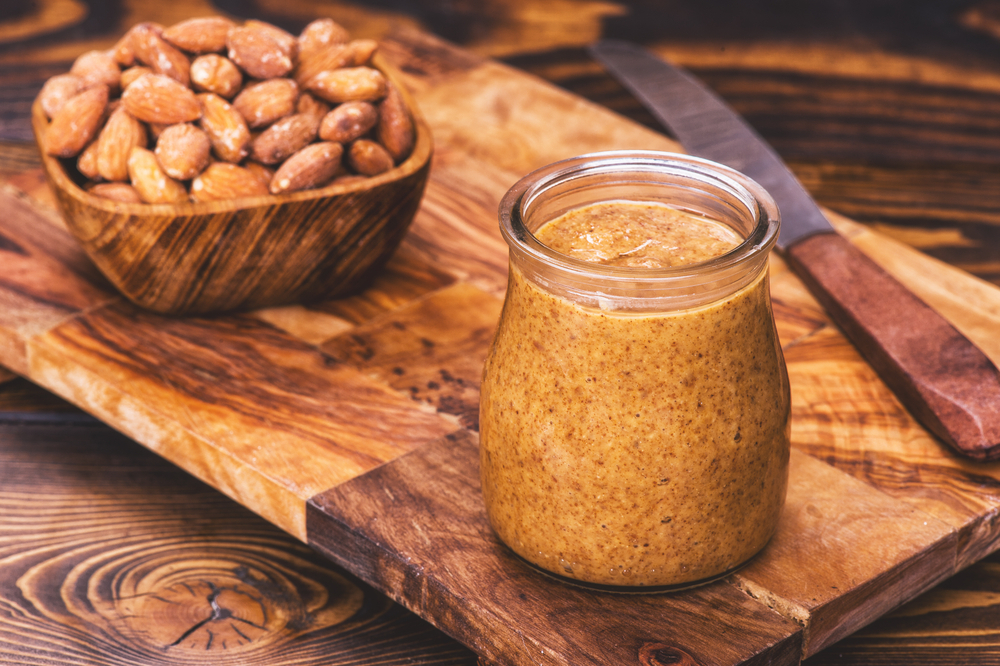
Good Source of Protein
Protein is an essential nutrient for dogs as it plays a crucial role in building and repairing tissues. Almond butter contains protein, which can contribute to your dog’s daily protein requirements. However, there should be other sources of protein in their diet.
Vitamin and Mineral Content
Almond butter also contains vitamins and minerals beneficial to a dog’s health. These include vitamin E, magnesium, phosphorus, and calcium. However, it’s important to note that a well-balanced dog food diet should provide all the necessary vitamins and minerals, making almond butter an unnecessary addition in most cases.
Healthy Fats and Omega-3s
The healthy fats in almond butter, such as monounsaturated fats and omega-3 fatty acids, can support your dog’s skin health, promote a shiny coat, and aid brain function.
Supports Muscle Development
Protein is an essential nutrient for muscle development and repair. Almond butter contains moderate protein, making it a potential addition to a dog’s diet to support muscle growth.
Potential Antioxidant Properties
Some studies suggest almonds may possess antioxidant properties due to their vitamin E and other phytochemical content. These antioxidants can help combat oxidative stress and support your dog’s immune system.
Moderation is Key
When feeding almond butter to your dog, moderation is key. Almond butter should be considered an occasional treat rather than a regular part of their diet. It is important to monitor your dog’s overall calorie intake and adjust their meals to prevent weight gain or nutritional imbalances.
Potential Risks of Feeding Almond Butter to Dogs
Also Read: CoffeeWood Dog Chew – Ultimate Guide
Allergic Reactions
Some dogs may be allergic to almonds or nuts, including almond butter. Allergies can manifest as itching, skin irritation, gastrointestinal upset, or even more severe symptoms like difficulty breathing. If you notice any signs of an allergic reaction, discontinue feeding almond butter immediately and consult with your veterinarian.
Can Dogs Be Allergic to Almond Butter?
Yes, dogs can be allergic to almond butter. Nut allergies are common in dogs, and almond butter is no exception. After consuming almond butter, you must monitor your dog for any signs of allergic reactions. If you notice itching, redness, swelling, or gastrointestinal issues, discontinue feeding almond butter and consult your veterinarian.
Can honey almond butter cause allergies in dogs?
While rare, some dogs may have allergies or sensitivities to almonds or other nuts. Monitor your dog for any adverse reactions after consuming honey almond butter.
Digestive Upset and Pancreatitis
Almond butter is high in fat, and excessive consumption can lead to digestive upset and potentially pancreatitis in dogs. Pancreatitis is an inflammation of the pancreas and can be a serious condition requiring veterinary treatment. Symptoms may include vomiting, diarrhea, abdominal pain, and loss of appetite. Monitoring your dog’s fat intake and avoiding overindulgence in almond butter is essential.
High-Calorie Content
Almond butter is calorie-dense so excessive consumption can contribute to dog weight gain. It’s important to account for the extra calories when incorporating almond butter into your dog’s diet, especially if they are prone to obesity.
Choking Hazard
Almond butter can be sticky and pose a choking hazard, especially if given in large dollops or if your dog tends to gulp food quickly. Be cautious and consider spreading a thin layer of almond butter on a treat or using it as a stuffing for interactive toys.
Also Read: Can Dogs Have Teriyaki Sauce? – Ultimate Guide
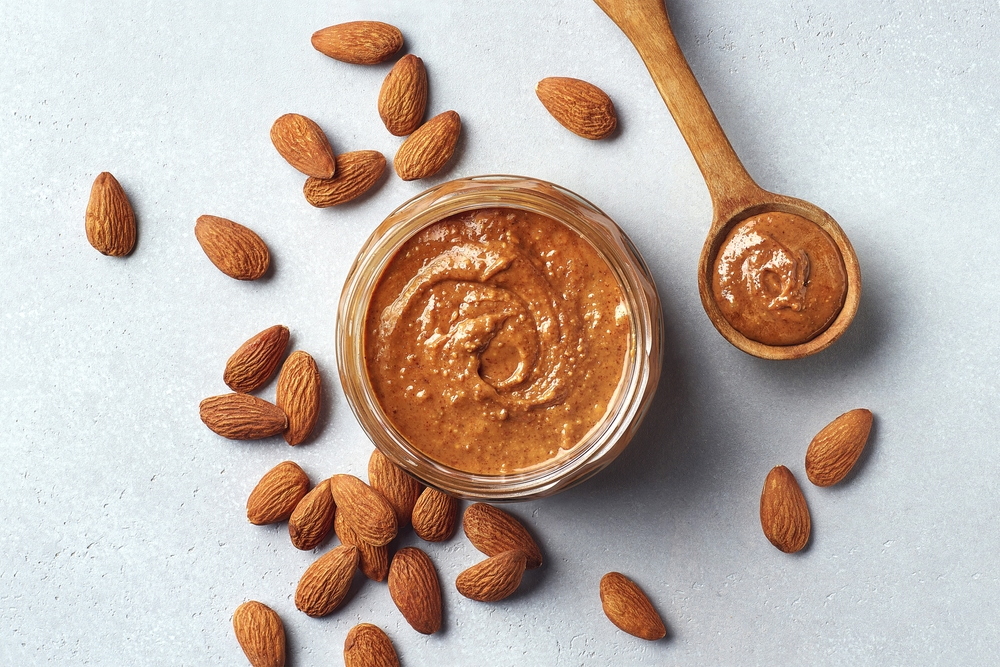
Salt and Sugar Content
When choosing almond butter for your dog, choose unsalted and unsweetened varieties. Excess salt and sugar can harm dogs and lead to various health issues such as dehydration, kidney problems, or weight gain.
Alternatives to Almond Butter
If you decide almond butter is unsuitable for your dog or want to explore other options, alternative spreads can provide similar benefits. Here are a few options:
Peanut Butter
Peanut butter is a popular choice for dog treats and enrichment toys. Ensure that the peanut butter you choose is free from xylitol, a sugar substitute that is toxic to dogs.
Sunflower Seed Butter
Sunflower seed butter is a nut-free alternative that can be a good source of healthy fats and protein for dogs. Check for any added ingredients that may be harmful to your pet.
Coconut Butter
Coconut butter is another option that offers a unique flavor and contains medium-chain triglycerides, which can provide energy for dogs. As with any new food, introduce it gradually to monitor your dog’s response.
Cashew Butter
Cashew butter is another option to consider. It is generally safe for dogs in moderation, but as with any new food, observe your dog for any adverse reactions.
Also Read: Can Dogs Eat Provolone Cheese? – Ultimate Guide
How to Safely Introduce Almond Butter to Your Dog
Monitor for Adverse Reactions:
When feeding almond butter to your dog, it’s essential to be mindful of portion sizes and frequency. A general guideline is to limit the amount of almond butter to no more than a teaspoon per 10 pounds of body weight. Remember, moderation is key to preventing excessive calorie intake and potential health issues.
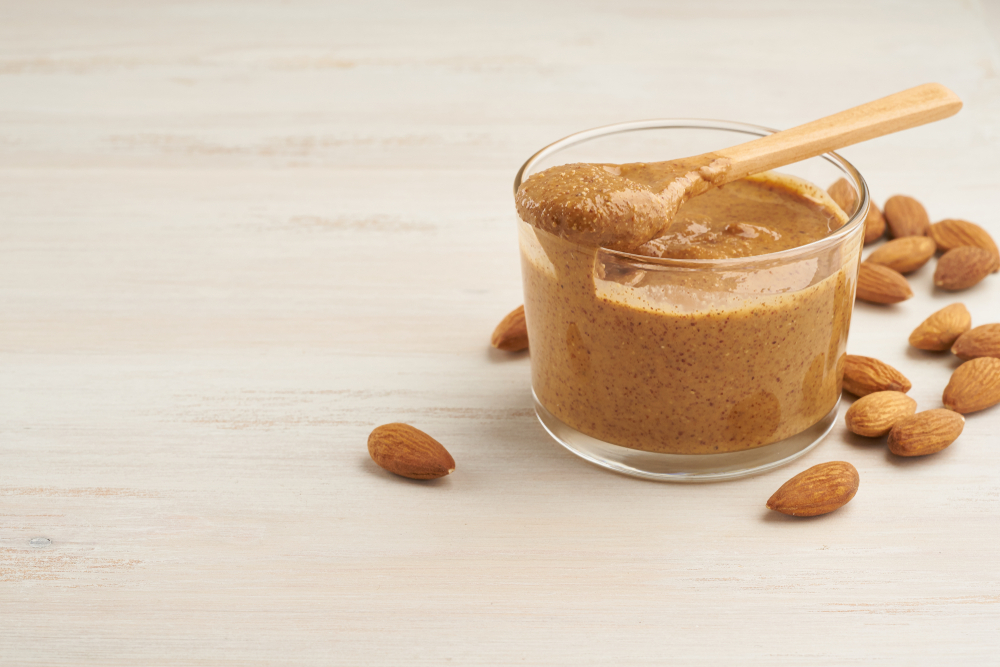
Signs of Allergic Reactions in Dogs
Dogs can exhibit various signs of allergic reactions when consuming certain foods. Keep an eye out for the following symptoms, which may indicate an allergic response to almond butter:
- Itching or Scratching🙁 Excessive itching, scratching, or redness may indicate an allergic response).
- Swelling:(Swelling of the face, throat, or any other body part should be taken seriously and requires immediate veterinary attention).
- Gastrointestinal Distress🙁 Vomiting, diarrhea, or changes in bowel movements can be signs of an allergic reaction).
- Difficulty breathing.
If you notice any of these signs, discontinue the use of almond butter and seek veterinary attention if necessary.
Can Dogs with Specific Conditions Eat Almond Butter?
For dogs with specific health conditions or dietary restrictions, it’s crucial to consult with your veterinarian before introducing almond butter. Certain conditions, such as pancreatitis, obesity, or allergies, may require tailored nutritional plans that exclude almond butter or limit its use.
Homemade honey almond butter Treats for Dogs
If you prefer making homemade treats for your furry companion, here’s a simple recipe for almond butter dog treats:
Ingredients:
- 1 cup whole wheat flour
- 1/2 cup almond butter
- 1/4 cup water
- Optional: dog-friendly toppings like shredded carrots or blueberries
Instructions:
- Preheat the oven to 350°F (175°C).
- Combine the flour, almond butter, and water in a mixing bowl. Mix well until you achieve a dough-like consistency.
- Roll out the dough on a floured surface and use cookie cutters to create fun shapes.
- Place the treats on a baking sheet lined with parchment paper.
- Optional: Add dog-friendly toppings for added flavor and nutrition.
- Bake for 15-20 minutes or until golden brown.
- Allow the treats to cool completely before serving them to your dog.
Frozen Almond Butter Treats
Ingredients:
- One ripe banana
- 1/2 cup almond butter
Instructions:
- Mash the ripe banana in a bowl until smooth.
- Mix in the almond butter until well combined.
- Spoon the mixture into ice cube trays or silicone molds.
- Place in the freezer for a few hours or until frozen.
- Pop out the frozen treats and store them in an airtight container in the freezer.
- Give your dog a frozen treat as an occasional refreshing snack.
Introducing Almond Butter to Your Dog’s Diet
Before introducing almond butter to your dog, remember a few important considerations.
Commercial Almond Butter Products for Dogs
If you prefer convenience or need more time to make homemade treats, there are commercially available almond butter products specifically made for dogs. These products are formulated with dog-friendly ingredients and often come in convenient packaging for easy serving. Remember to choose reputable brands and carefully read ingredient labels to ensure your dog’s safety.
The Importance of Consulting Your Veterinarian
It’s always important to consult your veterinarian before introducing new food into your dog’s diet. They can provide personalized advice based on your dog’s needs, health conditions, and dietary restrictions. Your veterinarian will be able to guide you on the appropriate portion sizes and frequency of almond butter consumption for your dog.
Gradual Introduction
When introducing almond butter, start with a small amount, such as a lick or a tiny portion, to observe your dog’s reaction. Gradually increase the quantity if your dog tolerates it well.
Start Slowly
Give your dog a small amount of honey almond butter and observe their reaction. You can gradually increase the portion size over time if there are no adverse effects.

Observing Your Dog’s Reaction
As you introduce almond butter to your dog’s diet, closely monitor their response for adverse effects.
Can all dogs eat almond butter?
While most dogs can safely consume almond butter, some may have allergies or sensitivities to nuts. It’s best to perform a small allergy test before incorporating almond butter into their diet.
Conclusion
In conclusion, while almond butter may offer some nutritional benefits for dogs, it has potential risks. Allergies, digestive upset, and pancreatitis are among the concerns associated with its consumption.
If you decide to feed almond butter to your dog, do so in moderation and under the guidance of your veterinarian. Always prioritize your dog’s overall balanced diet and consider safer alternatives when needed.









